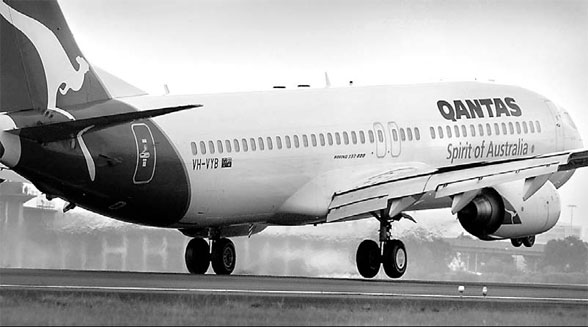Costs force Qantas to cut capacity
|
A Qantas Airlines jet lands at Kingsford Smith Airport in Sydney, Australia. Bloomberg News |
Qantas Airways Ltd, Australia's biggest carrier, will cut domestic routes and reduce the size of its fleet because of surging jet-fuel costs.
The airline will reduce capacity about 5 percent, including cuts at low-cost unit, Jetstar, it said in a stock exchange statement yesterday. That's equivalent to grounding six planes, the Sydney-based carrier said.
Qantas joins AMR Corp's American Airlines in cutting flights after being unable to cover higher fuel costs by raising ticket prices, adding surcharges and hedging. The airline's fuel bill, accounting for 35 percent of total costs, will jump A$2 billion ($1.9 billion) in the year ending June 2009, it said.
"It's very prudent of Qantas to take action to stem the hemorrhaging," said Chris Hall, who helps oversee the equivalent of $3.7 billion at Adelaide-based Argo Investments Ltd, including Qantas shares. "The US carriers are doing exactly the same thing."
American, Delta Air Line Inc and US Airways Group Inc have all announced plans to drop flights because of fuel costs.
Air New Zealand Ltd., the nation's biggest airline, said yesterday full-year profit will fall more than 23 percent because of soaring jet fuel prices.
Airlines globally may post a combined profit of $4.5 billion in 2008, 20 percent lower than a year earlier, the International Air Transport Association estimated in April. Jet-fuel prices have more than doubled in the past year and reached a record $173.55 a barrel in Singapore on Tuesday.
The prospect of continued high fuel prices caused Standard & Poor's to cut Qantas' credit and debt ratings outlook to negative from stable, according to a statement yesterday.
The risk of Qantas defaulting on its bonds increased. Credit-default swaps on the company's debt gained 3.5 basis points to 153.5 basis points at 3:30 pm in Sydney, according to Westpac Banking Corp. That means it costs $153,500 to protect $10 million of debt from default for five years.
Credit-default swaps protect creditors against default by paying the buyer face value in exchange for the underlying securities, or the cash equivalent, should the company fail to keep to its debt agreements.
Agencies
(China Daily 05/29/2008 page16)















